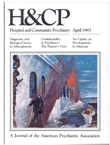Recent Developments in the Care, Treatment, and Rehabilitation of the Chronic Mentally Ill in Norway
Abstract
As in most other Western nations, the ideology shaping mental health care in Norway has shifted since World War II from a traditional institutional approach to a community-based concept of treatment for the chronic patient. And as in many other countries, communities have been poorly equipped to deal with the influx of deinstitutionalized patients. Few appropriate community alternatives have been developed to care for hospitalized patients, many of whom must remain institutionalized. The author reports on a 1979 census of Norway's mental patients which showed that about half of the mental hospital patients could be expected to remain in the hospital because adequate community facilities did not exist. However, the author says, there is a new interest in Norway in reducing the number of hospital beds and transferring more patients to community programs; one large mental hospital has recently been closed. Legislation focusing on patients' rights and new research on "quality of life" of patients are also pushing mental health care into the community, he says.
Access content
To read the fulltext, please use one of the options below to sign in or purchase access.- Personal login
- Institutional Login
- Sign in via OpenAthens
- Register for access
-
Please login/register if you wish to pair your device and check access availability.
Not a subscriber?
PsychiatryOnline subscription options offer access to the DSM-5 library, books, journals, CME, and patient resources. This all-in-one virtual library provides psychiatrists and mental health professionals with key resources for diagnosis, treatment, research, and professional development.
Need more help? PsychiatryOnline Customer Service may be reached by emailing [email protected] or by calling 800-368-5777 (in the U.S.) or 703-907-7322 (outside the U.S.).



